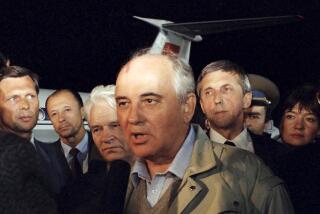Albanian Chieftain Hoxha Dies at 76--Still a Firm Stalinist
- Share via
VIENNA — Enver Hoxha, whose 42 years as Albania’s Communist Party chief made him the world’s longest-ruling communist leader, died today at age 76, the Albanian state-run ATA news agency reported.
Under Hoxha, Albania spurned both the Soviet Union and China, and became a virtual hermit nation, cut off from the rest of the world. The Maryland-sized country remained the last bastion of Stalinism in Europe, and Hoxha claimed that only Albania had kept to the path shown by Marx, Lenin and Stalin.
A founder of the Albanian Communist Party, Hoxha was the last of a generation of Balkan revolutionaries to emerge from the battlefields of World War II to become his country’s communist ruler.
His cause of death was officially reported as complications brought on by heart failure two days ago.
The Albanian leader had suffered from diabetes since 1948, ATA said in a communique monitored in Vienna. The disease caused extensive damage to blood vessels, heart, kidneys and other organs, the report said.
Briefly Reported
Both the official Soviet press agency Tass and the New China News Agency reported Hoxha’s death briefly and without comment, quoting the Albanian announcement.
No immediate successor was named, but diplomatic observers said the most likely candidate is President Ramiz Alia, 60, who ATA said will lead the funeral organizing committee.
Alia is an ideological purist who, if he becomes party leader, is likely to keep Albania on the stern Stalinist tracks laid down by Hoxha. A quiet man of intellectual appearance, Alia spent much of his career in propaganda, promoting the Stalinist line.
Under Hoxha, the Balkan country of 2.6 million people had the longest stretch of independence in its modern history.
Guerrilla Veteran
The son of a Muslim landowner from the southern city of Gjirokaster, Hoxha rose to power in the guerrilla struggles against Albania’s Italian occupiers in the 1940s and dominated the postwar political scene by maneuvering and ruthlessness.
He helped found the Albanian Communist Party on Nov. 8, 1941, and in 1943 was elected its leader.
Hoxha stamped out religion in Albania in the 1960s. Churches and mosques were converted into theaters, warehouses and stables. Clergymen disappeared. Some foreign historians trace Hoxha’s hatred of religion to his relationship with his father, reportedly a bigoted Muslim.
Rare Western visitors to Albania described cities without auto traffic, because private ownership of cars was prohibited. Practically all consumer goods were of local manufacture, and virtually all entertainment had revolutionary themes.
No Debts, No Taxes
But Hoxha’s Albania could also boast of no foreign debts and no taxes. It pointed to higher living standards than the backward mountain nation had ever known.
Hoxha followed the precepts of Soviet dictator Josef Stalin, and when the Soviet Union under Nikita S. Khrushchev began its “de-Stalinization,” Hoxha angrily turned his back on Albania’s main benefactor.
Diplomatic relations were severed in 1961, and Albania came to rely on China for technical expertise and imports. But that relationship, too, was doomed when China began its opening to the West after the death of Mao Tse-tung.
The final break came in 1978, leaving Albania nearly isolated and self-dependent.
More to Read
Sign up for Essential California
The most important California stories and recommendations in your inbox every morning.
You may occasionally receive promotional content from the Los Angeles Times.











